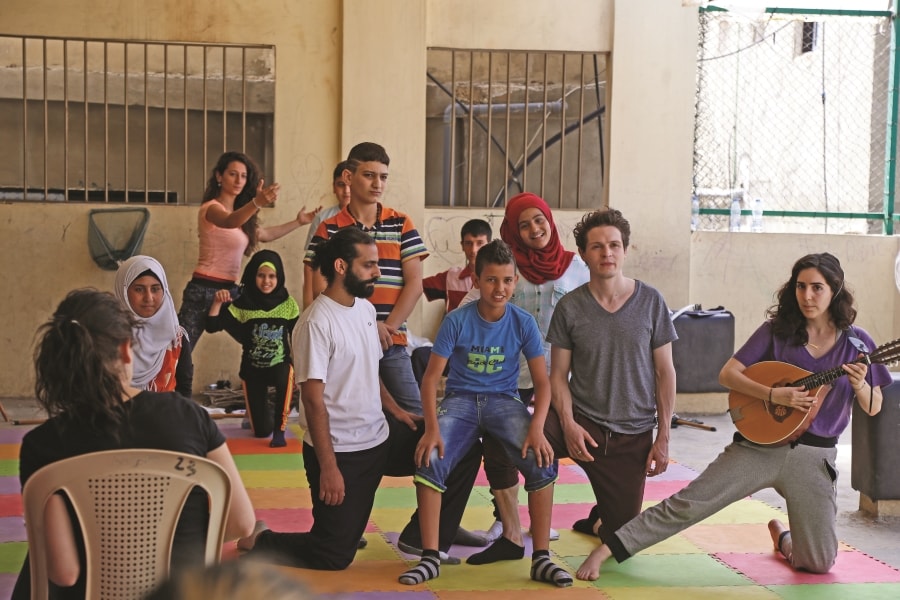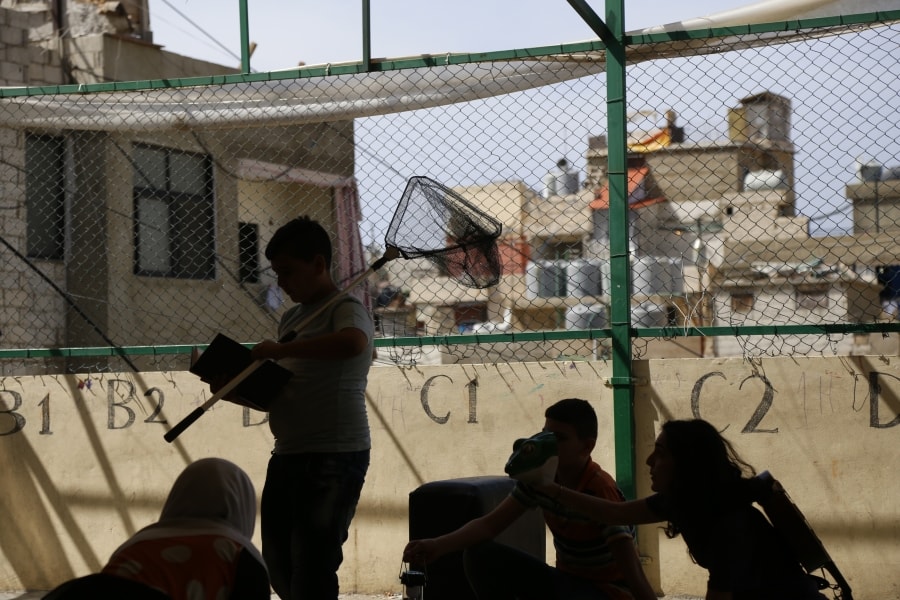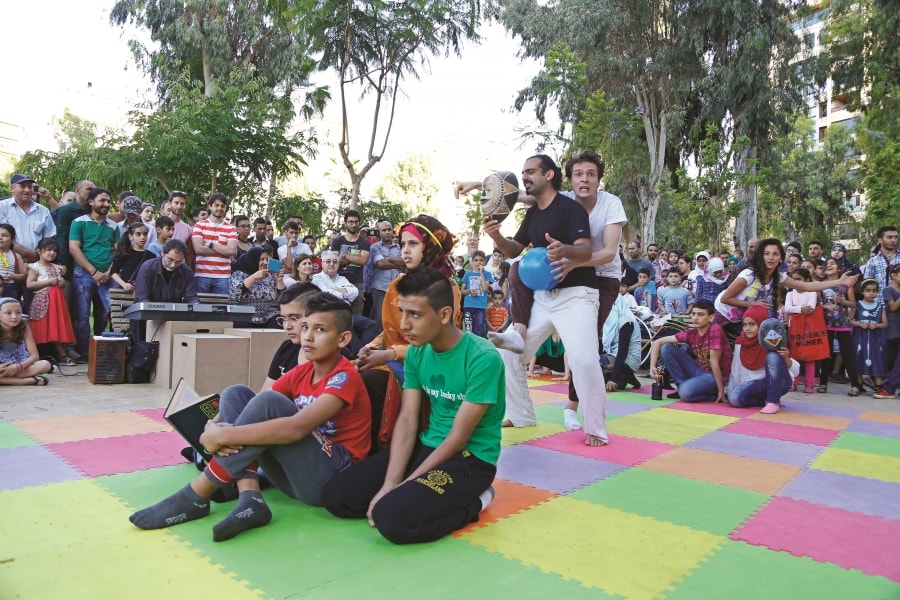The first time I lost faith in theatre was hours before our last performance. It was my 10th show in 6 days, the culmination of a year’s work on Family Ti-Jean, a double bill combining Derek Walcott’s Ti-Jean and His Brothers with Biljana Srbljanovic’s Family Stories, and performed by amateur teenage and professional adult actors and musicians representing various communities: Syrian and Palestinian refugees, Lebanese citizens, migrant workers, international artists. I needed a cup of Turkish coffee, and there was a five-minute break before we’d start preparing for our outdoor performance at the René Moawad Garden in Beirut, the capital and largest city of Lebanon. I left the group of young actors romping through the park, drunk on the early summer air, and returned to find them sullen and stewing in anger.
What had happened? We didn’t know at first what had gutted the young actors’ enthusiasm, because initially no one spoke. Having raced back to join the pre-show circle, a paper cup in each hand, I handed one of the coffees to Paul Spera, the French-American actor who played the unborn devil Bolom in Ti-Jean and His Brothers, and raised a questioning eyebrow at him. None of the adults knew what was happening.
Since it was Masrah Ensemble’s mission to encourage contact between different marginalized groups of various races and classes, we could only put on our show in unrestricted, shared milieus, and this urban gem of a park, known to locals as “Sanayeh,” was perfect. It’s centrally located, with minibus accessibility, open to African and Asian migrant workers, Arab refugees, and all kinds of Lebanese people. In a city where feverish privatization threatens public spaces, the few remaining ones almost split at the seams on a day off when the weather is beautiful. And it is so often beautiful in Beirut.
How many times had I read a grant application for “street theatre in Beirut” and scoffed, pondering what outmoded map the benefactors had been consulting? To find a place that is public and green is all too rare. (The World Health Organization recommends at least 9 square meters of green space per person; Beirut enjoys 1.6 square meters per person. For those living in refugee camps, that number is even smaller.)
All but one of the project’s seven young amateur actors lived in Shatila, the refugee camp established in 1949 for Palestinian refugees, now also accommodating thousands of Syrians since the outbreak of conflict in their country. It was also where we had rehearsed our show, in the activity rooms on the fourth floor of Basmeh & Zeitooneh, an NGO and school providing aid to Syrian refugees. The only places for children to play in Shatila were the caged roof of the school and a narrow, overcrowded labyrinth that ran through the permanent/temporary shelter.
So it was natural that any time away from the concrete residence was delirium. Eyad Houssami, founder of Masrah and director of our show, took this into consideration when dreaming up the project and strategizing the schedule. And oddly enough, whether we were rehearsing within the limestone walls of the American University of Beirut or underneath the pine trees at the city’s recently reopened forest reservation Horsh Beirut, the group required less time to center itself on our work than when we were crammed indoors on their home turf.
“Being outside reminds me of being back home in Syria,” 11-year-old Marah had said to me while warming up under a banyan tree at the university. She was playing the Mother in Ti-Jean and His Brothers, while her brother Murad played the title hero. The young actors’ bodies and breath expanded away from Shatila, their home for the past few years. They needed time to explore and connect with different spaces, to grow accustomed to seeing (and being seen by) new faces. Most important, they needed to feel like they belonged in this city, beyond the confines of the cinderblock camps.
Of course, they could never really belong. At least, this is what became apparent that afternoon when I heard 12-year-old Jamil—often the peacemaker of the group—repeat the words of a security guard who had spotted some of the boys from the cast roughhousing in the park’s public bathroom: “Syrian kids ruin everything.”
Everything, it seemed, that we had worked for in the course of a year with Masrah Ensemble had just melted away. Together we had endured gunshots on the street below our rehearsal room; persevered when one of our Palestinian participants immigrated to Sweden; reshuffled when Soubhi Shami, a Syrian actor living in Germany, was denied entry to Lebanon twice and got stranded in the Istanbul airport; and made the collective decision to perform on the day we mourned our production manager’s passing. All of it together, as a family.
By now we could gather in a circle without any hiccups or resistance. We could talk or not talk; what was most important is that we could breathe and just be collectively. Through this project, theatre had given us the ability to experience even the most painful events together, not in isolation. But could we face this kind of prejudice together?
Masrah Ensemble was trying to instill a sense of agency in the youngsters by getting them to tell their stories through Ti-Jean and His Brothers, a piece of Caribbean literature, and was now hoping to integrate them via performance into the patchwork of Beirut society. And all it took was a security guard’s callousness to unravel it all.

Nothing the young actors could have done would have merited that kind of discrimination, but they still blamed themselves—or, rather, blamed Ali, the maladroit preteen with unfading dark circles under his gentle eyes. Ali yowled in opposition as the rest of the boys, with the coaxing of Christine Youakim, our producer, began to explain. The girls too spoke with fervor, interrupting each other, and the story came together.
After having roamed around, the boys needed to go to the bathrooms, which, like the rest of the park, had been newly renovated. A South Asian restroom attendant (whom the kids referred to as “al sirilankiyyeh,” or “the Sri Lankan woman”) was present. Whenever they would use such derogatory language, Suha Nader, adult actor and educator, would question the youngsters about how they knew that someone was Sri Lankan—had they asked? I never learned what she had to do with the incident—had she tattled on them to the security guard?—but it made sad sense that just as the youngsters were blamed for being Syrian, the cycle of discrimination continued, as they linked their misfortune to a woman of (a different) color.
In the bathroom the boys participated in some horseplay among themselves; Ali confessed to having banged on a stall door until the guard immobilized them with his words. Ever since a luxury retail company had refurbished Sanayeh, a slew of strictly enforced rules now accompanied the lack of an entrance fee: no ball-playing, no touching the water in the fountain, no sitting on the grass, and no eating (especially any small nuts and seeds that might leave discarded shells behind).
And though Christine had made sure to explain all the rules to the preteens days before our performance, they still managed to attract security’s attention just by “being boys.” There was nothing we could have done to protect them from blatant contempt. It ran rampant in Beirut: It was not uncommon to hear that Syrians were the reason behind so many of the city’s problems, from the water shortage to the lack of jobs to the soiling of the supposedly unparalleled nightlife experience by the presence of beggars hanging around entrances to trendy bars, restaurants, and theatres.
A week before we opened, a Syrian beggar followed me en route to rehearsal. His persistence was good-humored, his Arabic was cynical and almost too grown-up; he asked to use my cell phone to call his uncle to pick him up. As he held the phone to his ear with his chubby fingers, catching his breath, his blue eyes flashed with mischief. “Hi, uncle. It’s me, Mohammad. I have a woman for you.”
I snatched the phone away and hung up. To lose Mohammad, I bought him a Big Mac and fries from the McDonald’s on the waterfront and marched on. It’s not that I wanted to reward him for sexualizing me. But after working so closely with the Family Ti-Jean preteens, I had a better understanding of that difficult in-between age of 10 to 14: growing up, not quite grown up.
Walcott’s play reflects those tensions. It captures a series of moments of transformation from child to adult under the subjugation of a white colonial fiend, surrounded by the wisdom of nature. At the project’s first two-week workshop in September 2015, we were met not just by maturing youngsters like those the play described but by a roomful of children, the youngest of them 4 years old.
An essential component of the project was language exchange: The adult and preteen actors worked together to translate Walcott’s poetry into spoken Arabic. To be eligible for the project, in fact, the young actors needed to have strong verbal skills to interpret lines tackling racial and class divides.
As the adults were putting on the Serbian Family Stories in repertory with Ti-Jean and His Brothers, we intentionally adopted the language patterns of the junior actors (as well as their physicalities, rhythms, and moods). This was yet another way of telling the story of postwar trauma as it related to the Syrian refugees. To facilitate this process, every actor we determined to be old enough served as a language coach to an adult actor, and vice versa.
For example, Imane, 13 years old and a self-described rabbet el manzil (“lady of the house”), was my language coach. Through the process, she never wrote a word in the diaries that Eyad had provided for brainstorming and documentation; instead she drew. We presumed that she was quasi-illiterate but never found out for sure. For Family Stories, she drilled me in her northeastern Syrian dialect, which I adopted for my outsider character, Nadezda.
During our later workshops in November and February, the kids we had turned away for being too young would fling open our rehearsal room door mid-session, bang on the balcony windows, or just try to insert themselves into our theatre games. It was heartbreaking having to dismiss them, but we—including the seven preteens who chose to work with us—learned to concentrate in spite of the disruptions. It was good practice for the real thing.
Participation ended up taking many forms. For our performances in May, Masrah Ensemble appointed some of the most intrusive pranksters from the Basmeh & Zeitooneh school to be junior stage managers and ushers, and they carried out their duties with pride. We even shared our pre-show meals (prepared by a Shatila-based cook) with our new assistants. The rest were invited as test audiences to our dress rehearsals.
If only theatre could always be so all-embracing! In Lebanon, where theatres are often in competition for the same few grants and end up being very exclusive, a preference for the most utilitarian drama emerges. While there is some Syrian presence onstage, it often fetishizes Syrian narratives, both expanding upon and complementing well-worn stories from mass media. While it is important to have Syrians tell their own stories onstage in their own words, we must challenge the expectations of audiences and funders by being wary of performing “Syrian-ness.” This is one reason Masrah insisted on producing a Caribbean play and a Serbian one.

On the day we found out that Alaa Eldin Mohammad Mohammad, our 25-year-old production manager from Syria, had drowned off the coast of Byblos, we ate our pre-show meal in silence, uncertain whether we would perform. As each one of us sank into our pain, drifting farther away from one another, Jamil quoted Ti-Jean: “I think nothing dies. My brothers are dead, but they live in the memory of our mother.”
Something shifted in the room. We could feel this loss together, and began discussing what would happen. Finally we all agreed that Alaa would have wanted us to go on with the show. So we did, and the performance was dedicated to his memory.
Many have asked us in Masrah Ensemble what this hodgepodge of people—Syrians, Lebanese, Palestinians, migrant workers, members of other marginalized communities—has to do with a story from the Caribbean, and how a postwar Serbian play connects to any of it. The answer is that exile, war, racism, and discrimination are universal, and it can be empowering to find that one’s suffering is not unique. So why do we have to constantly explain why this kind of theatre is valuable? Are other art forms as subject to these recurring question marks?
On that afternoon in the public garden, one such heavy black question mark loomed over me. Could we have shielded the young actors from the man’s hateful remarks? It is as if our invocation to breathe and open up to the world had damaged the young actors instead of helping them.
Soon enough, however, they were back to investigating the polished terrain and laughing, giddy with excitement for our last show. Hundreds of people had gravitated to the multicolored mat, which had become our safety blanket/playing space, transported to every venue. It was harder than ever to focus during the performance: Audience members picked up our props, snapped photos, and walked across our “stage.” When it came time for my character Frog’s big spiritual pep talk urging the hero to defeat the fiend, I said my lines:
Sing, Ti-Jean, sing!
Show him you could win!
Show him what a man is!
Sing, Ti-Jean…Listen,
All around you, nature
Still Singing…
I almost croaked in astonishment when I noticed Mohammad, the playful street rascal I’d met days ago, standing front and center in the audience, his face bright. For a moment I did not recognize him—just another face in a variegated forest of faces, another enthusiastic onlooker. His innocent blue eyes beamed at me, almost as if they were asking, “Do you see me?” I leapt in his direction and winked, letting him know that I saw him. He had finally caught up to me, and we were both standing on the same colorful mat. This time, however, I was not trying to lose him.
Milia Ayache is a Beirut-based actor, writer, Linux enthusiast, and member of Masrah Ensemble.


